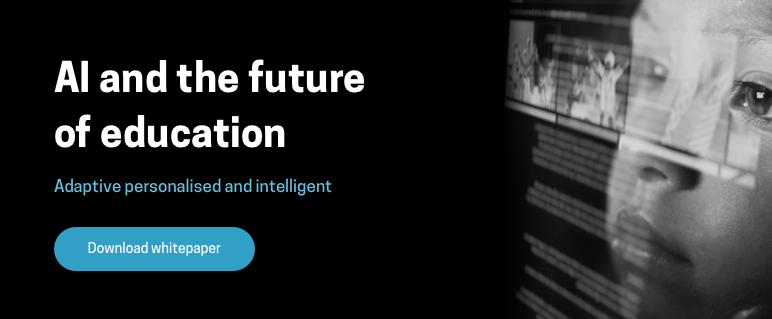To date, our blog series on AI in education has focussed on ‘the future’ and how AI could improve the delivery and provision of learning. Today, we’re looking at what technology is available and valuable to educators, now and why it pays to have an AI strategy.
Over the next few years we can expect to see incremental adoption of small-scale AI across all sectors and society at large – but it will take some time before truly effective use cases shine, particularly in the education sector which is typically slow to adopt to new technology. History suggests that the plethora of start-ups relying on marketing will fade, and the proven technologies will grow from plug-ins as small, supporting applications move to centre stage. Much like how personalised services and fluent, informative conversations with Alexa have become sophisticated and commonplace, organisational processes will become streamlined with unique and interactive insights.
Here are three ways you can ensure your institution’s processes will benefit from AI as it becomes available:
-
Work with edutech providers that have AIEd (artificial intelligence tools for education) as part of their product roadmap. That way, as their AI capability grows, the software you are using will become increasingly intelligent.
-
Use edtech such as your MIS, LMS and VLE solutions to your very best advantage by investing in software updates and training teams in the full functionality of the solutions etc.
- Actively start work on an AI strategy for your institution today, and ask your edutech partners for their support and advice.
What's your institution's AI strategy?
If your institution hasn’t already got a strategy to at least consider AI enhanced processes, then thinking now about how to automate and intelligently use your data will have major and immediate benefits. Getting started is as simple as answering the following questions:
- Teachers – What repetitive tasks could a computer assist you with? Good examples are chatbots, grading, attendance, and curriculum organisation.
- Administrators – how are other businesses automating their processes, and could those solutions be applied to your work?
- Execs, managers and business leaders – what will save you time, keep people happy and modernise your institution?
Whilst our best advice is to find relevant AI use cases to you, so you can distinguish the noise from the impactful tech, it will pay off to begin strategising now to set yourself ahead of the competition. Other sectors leading the charge such as finance, retail and healthcare with the flexibility to adapt AI platforms will be the perfect examples for education to follow. Many AI algorithms will start off applicable to smaller specialist institutions before growing to become the sector standard.
There are plenty of potential edu-technologies in the pipeline to monitor – and AI is likely to be the most pervasive considering its software first potential. Investing in complementary solutions that utilise AI insights and provide proven efficiency and revenue saving improvements will also help you pave the way to a modern and competitive institution.
A final note to the wise…
It’s also worth highlighting that there is a distinct shortage of AI skills in the UK*, so partnering up with and developing this talent now is a bold but strategic move and may open up an entirely new subject offering for your institution which will be in high demand in the coming years.
*The current AI skill base in the UK is not matching with projected industry requirements, with AI and data one of the four Grand Challenges that were identified in a 2017 Industrial Strategy whitepaper.
So what should we conclude from our blog series on AI in education?
- Artificial intelligence rhetoric is slowly turning into reality with recent international initiatives and large scale funding starting to integrate AI tech in both the public and private sector – but the AI skills gap is likely to hamper progress.
- Exaggerated claims of what can be achieved will fall to the wayside and actual use cases will come forth; but experiments at scale, particularly in education are yet to be utilised and will take some time.
- New concerns in data privacy and ethics with advanced analytics will arise, however the generation subjected to this will be used to sharing their data and already understands the benefits as well as the potential dangers. Nevertheless, this must be monitored for data privacy and ethical usage to be upheld.
- If utilised correctly, we will augment the role of institution staff, learners and educators to be efficient, adaptive, interactive and more intelligent - and ultimately improve every stage of the educational experience.
- Education services empowered by AI technologies will become the new standard.
- Partnering with edutech providers that have AIEd on their product roadmaps is a smart move, as is preparing your AI strategy so that you stay ahead of your competition.
For more information on what effect AI could have on your organisation, download our whitepaper by clicking the button below.
TOPICS:
Skills, Training and Employability
SHARE THIS ARTICLE:




